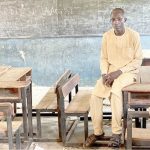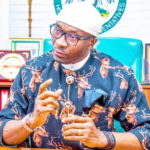The legendary Leonardo da Vinci did not receive a comprehensive structured formal education, that is “boko”. By and large, he was principally self-educated. It was the sheer and imaginative experience of life that lit the fire of cognitive abstraction. According to him, “simplicity is the ultimate sophistication”. But why?
Simplicity is always easy to understand. It creates substance and solves problems effortless. That is not all–coherence and intelligibility are also embodied in simplicity. All knowledge is actually just a quest for simplicity. The human brain does not learn the way we think it does… it does not obtain knowledge by sourcing it from an external source, it learns by unlocking it.
The human brain does extremely complex calculations and solves problems we cannot even fathom at a conscious level. If knowledge is the quest for simplicity, it makes sense that the process of obtaining it or unlocking it should also be simple.
There were news reports a few days back, that the House of Representatives is set to launch a new initiative to tackle the problem of out-of-school children in Nigeria using “alternative schooling”. The framework, which is in the form of an intervention through the House Committee on Alternative Education will also see the out-of-school children trained with relevant skills to become productive members of society.
- Best Kratom Vendors of 2024: Where To Buy High Grade Kratom Online
- Gunmen abduct women, kill vigilante commander in Kwara
While in Kano a few years back, I had the privilege of being part of the implementation teams of a number of social development projects especially those to do with education service delivery. From experience however, I know that most of those development interventions end up producing only lateral shifts with basically no strategic impact. The subject of out-of-school-children or OOSC happens to be a great area of interest. By some classifications, the almajirai are counted as OOSC, but I personally do not see it that way.
Simplicity is the key here as well: in northern Nigeria where the bulk of Nigeria’s OOSC are based, this is further compounded by the “almajiri” phenomenon. Almajiri means a migrant student going through the legacy education system of the pre-colonial Sudan. Parents seek out teachers with whom they send off their children to distant places where they camp and study the Qur’an and other Islamic subjects.
If they are technically students then they are not “out-of-school”. They learn both basic and advanced literacy skills and master the Islamic sciences but lack the vital numeracy and other academic skill-sets that are nonnegotiable in the fast-paced world of today. Nonetheless, in the context of this piece, the term OOSC will encompass al-majiris as well as school-aged children who are not in school.
The OOSC challenge in northern Nigeria is a difficult question to ask even though it is quite easy to answer. To decisively deal with this intractable problem, a radically different approach is clearly needed. Given the nature and demands of modernity, the almajiri/tsangaya system has become as obsolete as it is inefficient.
As pointed out, the question isn’t the lack of trial but the lack of imaginative ideas that take into consideration the context and root cause of this intractability instead of lateral measures such as building almajiri schools and such.
One thing worth noting here is that most consider or have considered these efforts as a continuation of the conspiracy to strip Muslims away from their culture and identity. This comes from the fact that those conspiracy theories were not completely unfounded given the stated objectives of the early colonial period when the authorities made efforts to convert Muslims including through subterfuge.
Colonialism was vividly defined by three overlapping concepts: Gold, Glory and Gospel. The Gospel aspect had rendered “boko”, or the western education system a poisoned chalice Muslims go out of their way to avoid.
While in Kano, myself and associates began an eponymous R&D effort tagged the “RUMFA Lever”, which stands for Revolving Uniform Management Framework for Almajiris Lever. This design seeks to induce and leverage the type of civil and intellectual revolution that followed the aftermath of the Sokoto Jihad, and in doing that, also to it that the solution to the contemporary obsolescence and social incompatibility of the “almajiri” teaching and learning order is engineered by the tsangaya intelligentsia itself.
This angle ensures that the reform process is participatory and therefore entrenched at the grassroots, making the program effective, efficient and its outcomes sustainable. This is so because legitimacy and trust are abject necessities… and to overcome the cultural dissent and/or resistance to the whole “boko” worldview, it becomes imperative to step back and look inwards.
This reform measure draws instructive inspiration from a defining event in the life of the first Muslim Sultan of Kano, Muhammadu Rumfa. As the story goes, the townsfolk once headed out in a protest procession to their king during the reign of Rumfa’s grandfather, Abdullahi Burja.
Rumfa was himself only a little older than a toddler at the time and was playing at the feet of his grandfather.
The complaint was that feral dogs invaded the town every night and ate the leftovers the townspeople saved for breakfast.
When no one could provide a solution, Muhammadu Rumfa suggested that everyone simply kept their leftovers on top of the “rumfa” or shed, in front of their huts. And from then on, he was known as Rumfar Sarki, the “king’s shed”, and on his ascension to the throne he took the name Muhammadu Rumfa.
Muhammadu Rumfa went on to become the greatest (Hausa) sultan of Kano. The remarkable thing about this solution is that it was as simple as it was obvious. The moral here is that people tend to get carried away with complex calculations when faced with nagging challenges and that usually comes at the cost of clarity and imagination.
RUMFA as a reform philosophy borrows heavily from the wisdom of Muhammadu Rumfa and will leverage simplicity and imagination to solve problems. The way this philosophy applies with regards to the RUMFA is in avoiding the reinvention of the wheel and simply UNDERSTANDING as well as sticking to what works.
It is quite obvious that the self-paced revolving uniformity of the tsangaya model works. The evidence of this is the fact that Nigeria has produced the best of the best in all the Islamic sciences. In Nigeria, Islam is taught and learned through the tsangaya model.
There are of course rough-edges to this design but it should be noted that this is still under development. But one thing is clear even so: that if, for instance, chemistry would be taught by a mallam seated on sheepskin in front of students wielding allo-slates, using the same methods he taught the Ishmawi and the Dala’ilu, Nigeria may well produce a Nobel laureate in Chemistry soon enough. The secret may be in understanding Rumfa and also understanding RUMFA in detail.
Ultimately, the aim is to make access to quality education a ubiquitous public utility throughout the stated catchment through simplicity and imagination. A well-educated human capital base is an absolute necessity for any prospects of a constructive revolution to be viable and subsequently productive in heralding the rapid industrialization and transformation of the region into a hub of next generation science and tech innovation.
To achieve this however, there has to be a wellspring of educated minds meaning no child is to be left behind. There is also the problem of quality and whether the targets are learning useful and practicable knowledge. The learning outcomes in most boko schools are extremely poor to begin with. In the case of the almajirai, they only learn the Qur’an and related subjects which do not offer a lot of mileage in the industrial age.
The problem is that the Sudanic population seems fixed in a particular intellectual framework which, as discussed, has maintained remarkable resistance to the boko model. Surmounting this problem will require the amount of energy and resources needed to reinvent the wheel and that explains why the challenge persists after decades of prodigious sunk costs.
RUMFA offers an effective and efficient vehicle of rapid progress in terms of quality education and the outcomes thereof. Necessity is the mother of invention they say, and this necessity is a demand for innovation, for thinking resourcefully both within and outside the box.
The availability of functional and acceptable educational opportunities is a major challenge standing in the way of sustained progress with respect to learning and skilling. If simplicity is the ultimate sophistication, RUMFA has a real potential of being the silver bullet to the problem in question.
 Join Daily Trust WhatsApp Community For Quick Access To News and Happenings Around You.
Join Daily Trust WhatsApp Community For Quick Access To News and Happenings Around You.


